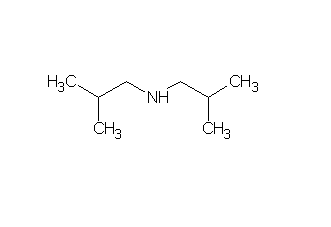
Structural formula
| Business number | 032H |
|---|---|
| Molecular formula | C8H19N |
| Molecular weight | 129.24 |
| label |
diisobutylamine, Aminodiisobutane, Bis(β-methylpropyl)amine, diisobutylamine, 2-Methyl-n-(2-methylpropyl)-1-propanamin, polymeric stabilizer, Nitrogen-containing compound solvent |
Numbering system
CAS number:110-96-3
MDL number:MFCD00008930
EINECS number:203-819-3
RTECS number:TX1750000
BRN number:1209251
PubChem ID:None
Physical property data
1. Properties: colorless transparent liquid with ammonia odor. [1]
2. Melting point (℃): -73.5[2]
3. Boiling point (℃): 139.6[3]
4. Relative density (water = 1): 0.745[4]
5. Relative vapor Density (air=1): 4.46[5]
6. Saturated vapor pressure (kPa): 0.97 (25℃)[6]
7. Heat of combustion (kJ/mol): -5644.9[7]
8. Critical temperature (℃): 306.7[8]
9. Critical pressure (MPa): 2.57[9]
10. Octanol/water partition coefficient: 2.84~3.04[10]
11. Flash point (℃): 29 (CC) [11]
12. Solubility: Slightly soluble in water, soluble in ethanol, ether, acetone and benzene. [12]
13. Refractive index (20ºC): 1.4124
14. Vapor pressure (kPa, 30.6ºC): 1.33
15. Heat of combustion (KJ/mol): 5644.9
16. Heat of evaporation (KJ/mol, 134ºC): 275.1
17.pKa: 10.50
Toxicological data
1. Acute toxicity[13] LD50: 258mg/kg (rat oral)
2. Irritation No information available
Ecological data
1. Ecotoxicity[14] LC50: 20~40mg/L (24h) (fish)
2. Biodegradability[15] MITI-I test, initial concentration 100ppm, sludge concentration 30ppm, 63% degradation after 4 weeks ~87%.
3. Non-biodegradability[16] In the air, when the hydroxyl radical concentration is 5.00×105 pieces/cm3, the degradation half-life is 4h (theoretical).
Molecular structure data
1. Molar refractive index: 42.62
2. Molar volume (cm3/mol): 170.1
3. Isotonic specific volume (90.2K ): 373.1
4. Surface tension (dyne/cm): 23.1
5. Polarizability (10-24cm3): 16.89
Compute chemical data
1. Reference value for hydrophobic parameter calculation (XlogP): 2.5
2. Number of hydrogen bond donors: 1
3. Hydrogen bond acceptor�Number: 1
4. Number of rotatable chemical bonds: 4
5. Number of tautomers:
6. Topological molecule polar surface area ( TPSA): 12
7. Number of heavy atoms: 9
8. Surface charge: 0
9. Complexity: 49.6
10. Number of isotope atoms: 0
11. Number of determined atomic stereocenters: 0
12. Number of uncertain atomic stereocenters: 0
13. The number of determined stereocenters of chemical bonds: 0
14. The number of uncertain stereocenters of chemical bonds: 0
15. The number of covalent bond units: 1
Properties and stability
1. Chemical properties: It has the chemical properties of secondary amines, and its aqueous solution is alkaline. The nitrite of diisobutylamine is decomposed with acetic anhydride and nitric acid in the presence of zinc chloride to generate N,N-diisobutylacetamide and diisobutylnitramine.
2. Stability[17] Stable
3. Incompatible substances[18] Strong oxidants, acids
4. Conditions to avoid contact[19] Heating
4. Hazards of aggregation[20] No aggregation
Storage method
Storage Precautions[21] Store in a cool, ventilated warehouse. Keep away from fire and heat sources. The storage temperature should not exceed 37°C. Keep container tightly sealed. They should be stored separately from oxidants and acids, and avoid mixed storage. Use explosion-proof lighting and ventilation facilities. It is prohibited to use mechanical equipment and tools that are prone to sparks. The storage area should be equipped with emergency release equipment and suitable containment materials.
Synthesis method
Refining method: Depending on the preparation method, it often contains unreacted raw materials and other amines and other impurities. It is generally refined by fractional distillation.
Purpose
1. Used as polymerization stabilizer for propylene oxide, etc.
2. Used as an intermediate in organic synthesis. [22]

 微信扫一扫打赏
微信扫一扫打赏

